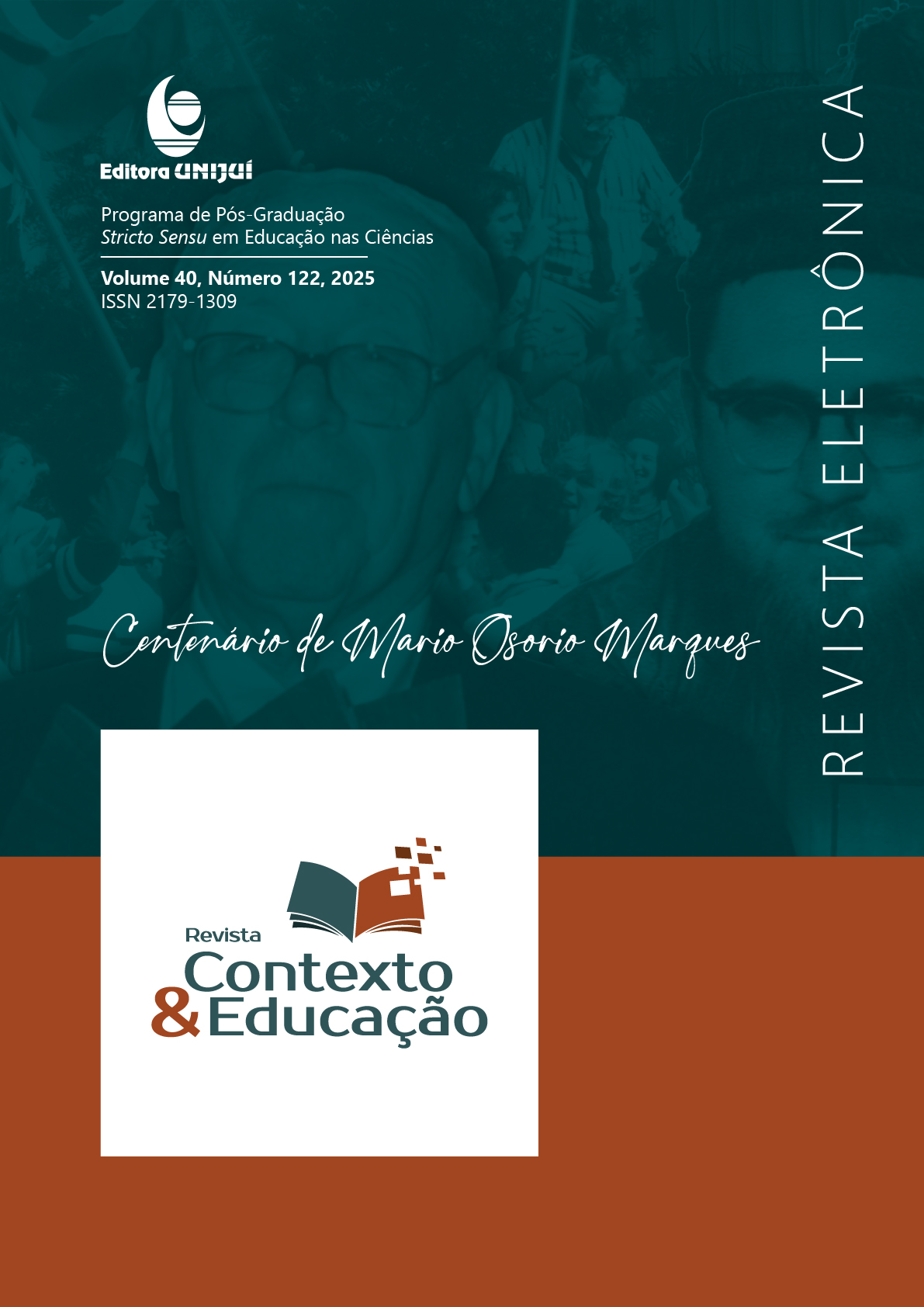O aluno com dislexia na escola: Um olhar a partir de propostas pedagógicas inclusivas
DOI:
https://doi.org/10.21527/2179-1309.2025.122.16681Palavras-chave:
Transtorno de leitura, ensino e aprendizagem, importância da leituraResumo
O presente trabalho parte do interesse por uma busca de metodologias que favoreçam a pratica pedagógica com o olhar voltado ao trabalho inclusivo de crianças e jovens que apresentam transtorno de leitura definido como dislexia. Notamos que é fundamental uma adaptação dos contextos escolares a fim de garantir aos alunos um ensino e aprendizagem de qualidade. Dessa maneira, com base nas perspectivas teóricas de Dehaene (2012), Petrossi (2004), Castrillon (2013), Leffa (2006), Sampaio (2014), Kleiman (2000), Batista (2017), entre outros, este trabalho foi dividido em três capítulos: a importância da leitura e o lugar do aluno com dislexia nesse processo; dislexia e seus efeitos; e, por fim, o jogo como ferramenta de apoio pedagógico. Para a pesquisa, buscamos arrolar os principais processos desviantes durante a leitura oral em crianças e jovens diagnosticados com dislexia. Além disso, desenvolvemos um jogo com atividades de estímulos para aumentar a consciência fonêmica, partindo da identificação e reconhecimento de sílabas, palavras e sons, aplicando e analisando sua eficácia por meio de testes de leitura e organização do jogo, sendo esse o objetivo principal deste trabalho. Os participantes desta pesquisa foram crianças e jovens diagnosticados com dislexia. Ao todo, foram cinco participantes na faixa etária de nove (09) a doze (12) anos. Após a aplicação do jogo, observamos que os casos mais leves de dislexia apresentaram menos dificuldades do que os participantes com estágios mais avançados, mesmo apresentando diferentes graus de progressos com o jogo, todos demonstraram interesse em aprender.
Referências
ASSOCIAÇÃO BRASILEIRA DE DISLEXIA. Como interagir com o disléxico na sala de aula. Disponível em: http://dislexia.org.br/v1/index.php/health-living-c/140-como-interagir-com-o-dislexico-em-sala-de-aula. Acesso em: 22 jul. 2022.
BATISTA, Jeize de Fátima; GONCALVES, Ana Cecília Teixeira; ZIESMANN, Cleusa Inês. Dislexia e os desafios do processo de Ensino e Aprendizagem no ambiente escolar. In: ZIESMANN, Cleusa Inês; BATISTA, Jeize de Fátima; DANTAS, Nozangela Maria Rolim Dantas (Orgs). Educação Inclusiva e Formação Docente: olhares que se entrelaçam. 1ed. Campinas, SP: Pontes, 2020. p. 19- 38.
BATISTA, Jeize de Fátima. O software como ferramenta de ensino: estimulando a leitura em crianças e jovens diagnosticados com dislexia. Tese de Doutorado em Letras - Centro Universitário Ritter dos Reis, Porto Alegre, 2017.
BRAGA, Regina M.; SILVESTRE, Maria de F. Barros. Construindo o leitor competente. São Paulo: Petrópolis, 2002.
BRASIL. Lei nº 13.146, de julho de 2015. Institui a Lei Brasileira de Inclusão da Pessoa com Deficiência (Estatuto da Pessoa com Deficiência), Brasília, 2015. Disponível em: http://www.planalto.gov.br/ccivil_03/_ato2015-2018/2015/lei/l13146.htm. Acesso em: 30 jul. 2022.
BRASIL. Ministério da Educação e Cultura. Diretrizes operacionais da educação especial para o atendimento educacional especializado na educação básica. Disponível em http://portal.mec.gov.br/index.php?option=com_docman&view=download&alias=428-diretrizes-publicacao&Itemid=30192. Acesso em: 26 jul. 2022.
CASTRILLON, Luciana Maria Teixeira. Problemas de aprendizagem, soluções de aprendizagem: respostas instrucionais para as necessidades de cada aprendiz. In: ALVES, Luciana; MOUSINHO, Renata; CAPELLINI, Simone. Org(s). Dislexia: novos temas, novas perspectivas. Rio de Janeiro: Wak Editora, 2013. p.371-404.
DEHAENE, Stanislas. Os neurônios da leitura: como a ciência explica nossa capacidade de ler. Porto Alegre: Penso, 2012.
FREIRE, Paulo. Pedagogia da autonomia: saberes necessários à prática educativa. São Paulo: Paz e Terra, 1996.
KLEIMAN, Ângela. Texto e leitor: Aspectos cognitivos da leitura. 7ª ed. - Campinas, SP: Pontes, 2000.
LEFFA, Vilson J. Aspectos de leitura. Porto Alegre, Sagra: DC Luzzatto, 1996.
MASSI, Giselle. A dislexia em questão. São Paulo: Plexus Editora, 2007.
NEVES, Maria da Graça Gonçalves Cunha. Investigação de processos neurolinguísticos de sujeitos com distúrbios significativos de leitura/escrita em contextos/acadêmicos. 2014. 100 f. Dissertação (Mestrado em Letras) - Universidade Católica de Pelotas, Pelotas, 2014. Disponível em: http://tede.ucpel.edu.br:8080/jspui/handle/tede/361. Acesso em: 29 jul. 2022.
ORGANIZAÇÃO MUNDIAL DA SAÚDE. Classificação de transtornos mentais e de comportamentos da CID 10: descrições clínicas e diretrizes diagnósticas. Porto Alegre: Artes Médicas,1993.
PETROSSI, Eduardo. O que é Dislexia. Revista Superinteressante. Edição 207, dezembro de 2004. Disponível em: http://super.abril.com.br/ciencia/o-que-edislexia. Acesso em: 26 jul. 2022.
SAMPAIO, Sampaio. Aspectos Neuropsicopedagógicos da Dislexia e sua influência em sala de aula. In: SAMPAIO, Simaia; FREITAS, Ivana Braga (Orgs.) Transtornos e dificuldades de aprendizagem: entendendo melhor os alunos com necessidades educativas especiais. 2. ed. Rio de Janeiro: Wak Editora, 2014.
Downloads
Publicado
Como Citar
Edição
Seção
Licença
Copyright (c) 2025 Revista Contexto & Educação

Este trabalho está licenciado sob uma licença Creative Commons Attribution 4.0 International License.
Ao publicar na Revista Contexto & Educação, os autores concordam com os seguintes termos:
Os trabalhos seguem a licença Creative Commons Atribuição 4.0 Internacional (CC BY 4.0), que permite:
Compartilhar — copiar e redistribuir o material em qualquer meio ou formato;
Adaptar — remixar, transformar e criar a partir do material para qualquer fim, inclusive comercial.
Essas permissões são irrevogáveis, desde que respeitados os seguintes termos:
Atribuição — os autores devem ser devidamente creditados, com link para a licença e indicação de eventuais alterações realizadas.
Sem restrições adicionais — não podem ser aplicadas condições legais ou tecnológicas que restrinjam o uso permitido pela licença.
Avisos:
A licença não se aplica a elementos em domínio público ou cobertos por exceções legais.
A licença não garante todos os direitos necessários para usos específicos (ex.: direitos de imagem, privacidade ou morais).
A revista não se responsabiliza pelas opiniões expressas nos artigos, que são de exclusiva responsabilidade dos autores. O Editor, com o apoio do Comitê Editorial, reserva-se o direito de sugerir ou solicitar modificações quando necessário.
Somente serão aceitos artigos científicos originais, com resultados de pesquisas de interesse que não tenham sido publicados nem submetidos simultaneamente a outro periódico com o mesmo objetivo.
A menção a marcas comerciais ou produtos específicos destina-se apenas à identificação, sem qualquer vínculo promocional por parte dos autores ou da revista.
Contrato de Licença (para artigos publicados a partir de outubro/2025): Os autores mantém os direitos autorais sobre seu artigo, e concedem a Revista Contexto & Educação o direito de primeira publicação.


